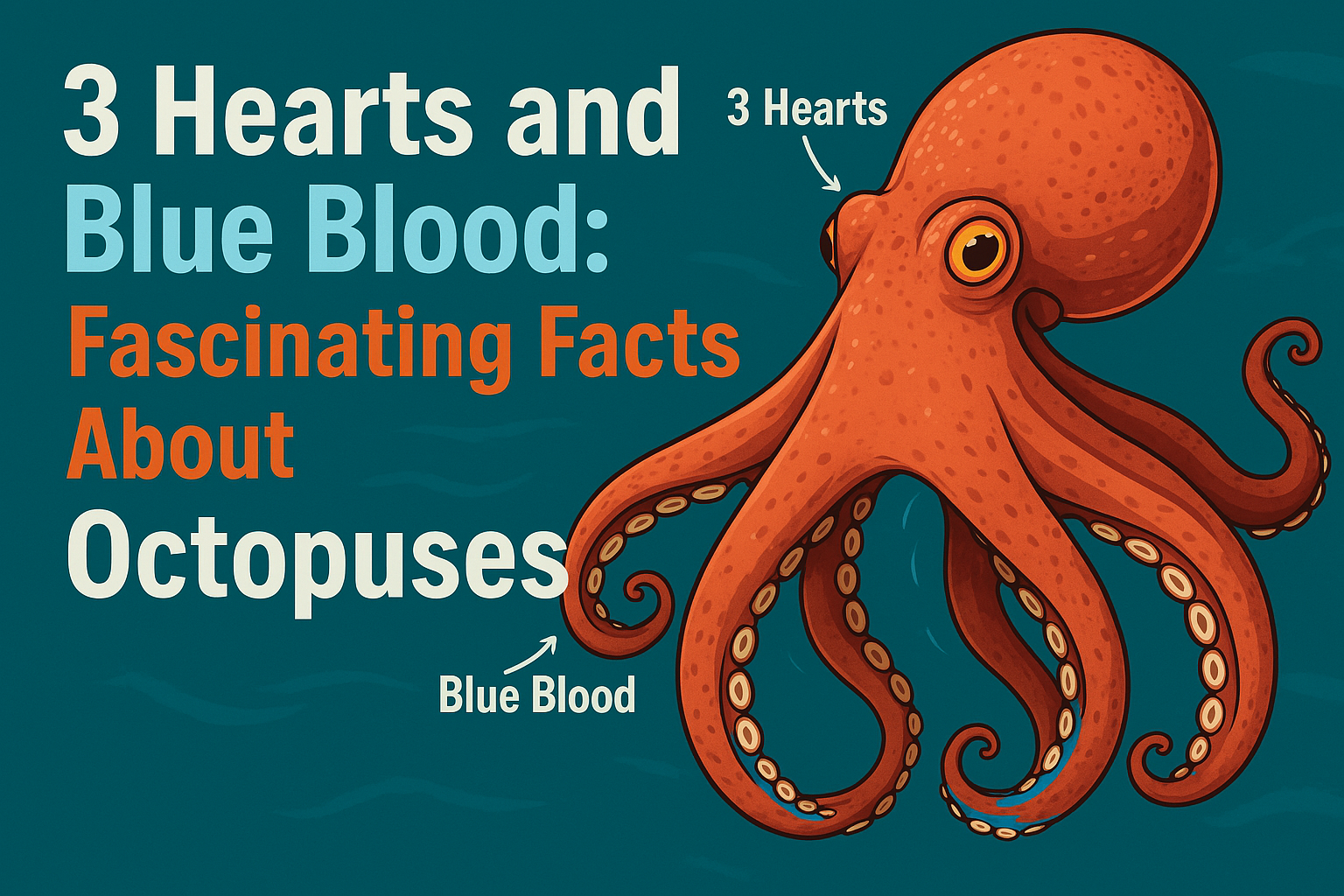3 Hearts and Blue Blood: Fascinating Facts About Octopuses
Do you know that octopuses are some of the most fascinating, intelligent, and alien-like creatures living in our oceans today? These invertebrates are full of surprises—from having three hearts to pumping blue blood through their bodies. They’re also masters of disguise, puzzle-solvers, and have been known to escape from aquariums using brainpower alone.
In this blog post, we’re going to dive deep into the ocean and explore some of the most fascinating facts about octopuses—and by the end, you’ll understand why these mysterious animals continue to amaze scientists and animal lovers alike.
What Makes Octopuses So Unique?
Before we get into the nitty-gritty details, let’s take a quick look at what makes an octopus so special in the first place. Octopuses are cephalopods—a class of mollusks that includes squids and cuttlefish. But unlike their cousins, octopuses live solitary lives, often hiding in rocks or coral reefs, watching the world through their large, expressive eyes.
Their soft, boneless bodies, ability to squeeze through tiny spaces, and high intelligence make them one of the most unique creatures on the planet.
Three Hearts: The Circulatory System of an Octopus
Yes, you read that correctly. One of the most bizarre facts about octopuses is that they have three hearts. But why would a creature need three?
Let’s break it down:
- Two branchial hearts: These pump blood to each of the octopus’s two gills.
- One systemic heart: This heart circulates oxygenated blood to the rest of the body.
Interestingly, when an octopus swims, its systemic heart stops beating. That’s why octopuses prefer crawling over swimming—it’s simply less tiring. Evolution has equipped them with this system to ensure efficient oxygen delivery, especially in deep or cold environments where oxygen is sparse.
Blue Blood: A Deep-Sea Survival Trick
Another surprising fact: octopuses have blue blood. This unusual trait comes from a copper-rich protein called hemocyanin, which they use to transport oxygen.
Unlike hemoglobin (which contains iron and makes our blood red), hemocyanin contains copper, and when oxygenated, it turns blue. This adaptation helps octopuses survive in low-oxygen environments like the deep sea, where temperatures are cold and conditions can be extreme.
So the next time you’re talking ocean trivia, don’t forget this wild fact about octopuses—they are literally blue-blooded nobles of the deep!
Do You Know How Smart Octopuses Really Are?
Octopuses are often called the geniuses of the sea—and with good reason. Their intelligence rivals that of some mammals and birds. They’ve been seen:
- Solving mazes and puzzles
- Opening jars to retrieve food
- Escaping enclosures with shocking creativity
- Using tools like coconut shells for shelter
- Mimicking other marine animals
One reason for this intelligence is their unique nervous system. Unlike humans, two-thirds of an octopus’s neurons are located in its arms, not its head. This means each arm can operate semi-independently, reacting to touch, exploring objects, or even tasting their environment.
They also have excellent short- and long-term memory and can learn from experience—a rare trait among invertebrates. These mental abilities are among the most incredible facts about octopuses that scientists are still studying today.
Masters of Disguise: Camouflage Like No Other
Another astonishing ability? Octopuses are world-class camouflage experts. Thanks to specialized skin cells called chromatophores, iridophores, and leucophores, they can instantly change their color, pattern, and even texture to blend into their surroundings.
This helps them:
- Evade predators
- Sneak up on prey
- Communicate with other octopuses
- Express moods or intentions
Short Lives but Rich Stories
As fascinating as octopuses are, their lives are surprisingly short. Most species only live 1 to 2 years, and the giant Pacific octopus—the longest-lived—survives for just 3 to 5 years.
After mating, the male dies shortly afterward, and the female devotes the rest of her life to protecting her eggs. During this period, she often stops eating and dies once the eggs hatch. It’s a bittersweet end, but it’s part of the natural cycle that has continued for millions of years.
Despite their short lives, octopuses pack in a lifetime of intelligence, problem-solving, and survival mastery.
Other Amazing Facts About Octopuses
Let’s wrap up with a few more wild and wonderful facts about octopuses that make them truly unique:
- They have no bones, so they can squeeze through openings as small as a coin.
- Each arm has its own mini-brain and can work independently.
- Octopuses have beaks, like birds, used to crack open shellfish and crabs.
- They can regrow lost limbs, making them regenerative creatures.
- They squirt ink to confuse predators and make a quick getaway.
- They taste with their suckers, giving them a full sensory experience with every touch.
FAQs About Octopuses
Do octopuses really have three hearts?
Yes! Two branchial hearts pump blood through the gills, and one systemic heart circulates blood through the body. When swimming, the systemic heart takes a break, which is why octopuses tire quickly.
Why is their blood blue?
Octopuses use a copper-based molecule called hemocyanin to carry oxygen, which turns blue when oxygenated. This makes them more efficient in cold and low-oxygen waters.
Are octopuses dangerous to humans?
Most are harmless, but some—like the blue-ringed octopus—have venom that can be deadly. That said, octopuses are generally shy and prefer to hide rather than fight.
How do octopuses camouflage so effectively?
Their skin contains pigment cells (chromatophores) and reflectors (iridophores) that allow them to change color and texture almost instantly to match their surroundings.
Are octopuses really smart?
Absolutely. They can learn, solve complex problems, and even plan ahead—traits typically associated with mammals like dolphins or primates.
Nature’s Underwater Marvel
With three hearts, blue blood, and a brain that stretches into its limbs, the octopus is nothing short of a natural marvel. These alien-like sea creatures defy everything we expect from marine life. Whether it’s their intelligence, camouflage skills, or strange biology, the ocean’s most mysterious invertebrate has earned its place in the spotlight.
So next time you’re near the ocean, or watching a documentary, remember these fascinating facts about octopuses—and share them. Because the more we learn about these intelligent, quirky creatures, the more we understand just how strange and wonderful our planet truly is.






